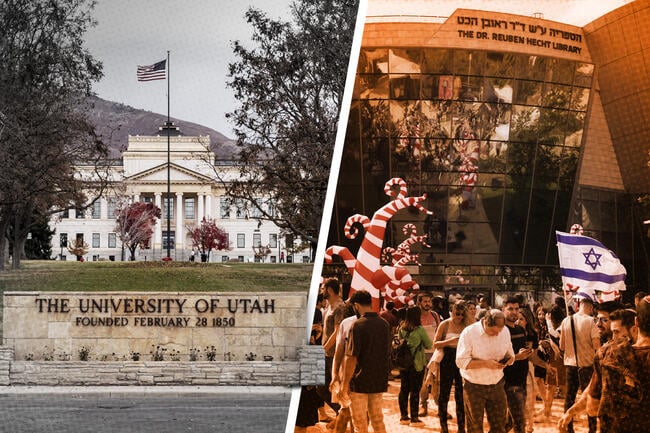You have /5 articles left.
Sign up for a free account or log in.

The University of Utah signed a deal with Ariel University (right), which is located in an Israeli settlement.
Last month the University of Utah signed a one-page memorandum of understanding with Ariel University, listing its new partner as located in Ariel, Israel. It’s a broad, nonspecific agreement: The institutions say they’ll exchange faculty and students, and their cooperation “may extend to any fields and subjects” where they share interests.
But faculty at the University of Utah, known as the U, have criticized the agreement because of where Ariel actually is—and because they say they weren’t notified of the deal ahead of time.
Ariel isn’t within Israel’s internationally recognized borders; it’s in a settlement on Palestinian land in the West Bank. The United Nations calls such settlements illegal under international law. Ariel was the first higher ed institution located in a settlement to gain the “university” designation.
The controversy comes after Israel’s ongoing war against Hamas in Gaza renewed debate within U.S. academe about whether faculty, scholarly associations and institutions should boycott Israel, including its universities. But while those debates have focused on institutions within Israel’s recognized boundaries, the University of Utah’s new partnership steps outside those.
Michael Christopher Low, director of the U’s Middle East Center, wrote in a message to Inside Higher Ed that neither he nor his colleagues at the center were consulted about the deal.
“While I cannot speak on behalf of the institution, I disagree with this decision and am deeply disappointed,” Low said. He didn’t comment further on why.
Richard Preiss, president of the U’s Academic Senate, said that “as far as I know, the faculty who learned of it learned of it from the press, from The Jerusalem Post, which is probably not ideal.”
Following public criticism, the University of Utah posted a statement on its website saying, “Campus community members have raised questions and concerns about the MOU serving as a statement of support for Israel in its war in Gaza, or a divergence from state law which requires institutional neutrality. Neither is true.” The university said it “has more than 100 such agreements—including in India, Egypt, Saudi Arabia and Turkey.”
But the Los Angeles–based Consul General of Israel to the Pacific Southwest, Israel Bachar, said the deal represents more than a routine MOU, according to his quotes in the Jerusalem Post article announcing the agreement.
Bachar took credit for helping broker the partnership, the Post reported. Bachar also said it “marks a new chapter in academic cooperation between Israel and the United States” and “proves the connection between peoples transcends politics and focuses on what truly matters—advancing technological knowledge, student exchanges and links between medical faculties and artificial intelligence,” the newspaper reported.
Bachar also called the two universities’ engagement “brave” when “campuses are being taken over by protesters in keffiyehs calling for a Palestinian state ‘from the river to the sea,’” the Post reported. The consul general’s office didn’t respond to Inside Higher Ed’s requests for an interview or answer written questions.
“I reject Consul Bachar’s framing that this decision represents the University of Utah taking a position on the war in Gaza or the Palestinian Occupied Territories,” University of Utah spokesperson Rebecca Walsh said in an email to Inside Higher Ed. “The university, as a state institution, is not allowed to take political positions."
Mark Lewis, a spokesperson for Ariel University, wrote in an email to Inside Higher Ed that “although we’ve signed several smaller MOUs with U.S. universities, none of those partners had the international standing that the University of Utah brings. In that sense, this is our first truly ‘major’ American agreement in Judea and Samaria.”
“Judea and Samaria” is Israel’s term for the West Bank.
Florida Atlantic University signed an MOU with Ariel University back in 2019 “to develop and exchange opportunities for scholars and students alike, and explore cooperative research opportunities” regarding health care, according to an FAU news release.
A Jewish senior professor in the University of Utah College of Humanities who wished to remain anonymous said “all of this came as a blindside” to faculty who work in Middle Eastern studies.
“This move will completely delegitimize them in their field,” the professor said. “Nobody will trust them or the university, because they have taken sides in this situation.”
The professor added, “My fear is that the university got played by the Israeli consul in an effort to legitimize the settlement.”
Land Acknowledgment
The University of Utah’s Faculty for Justice in Palestine chapter has released multiple statements calling for an end to the partnership, saying it’s a violation of state and federal law. Days after The Jerusalem Post revealed the MOU, the FJP chapter said Ariel University “denies admission and employment to the Palestinians whose land they stole.”
“Because Israel and the settlement of Ariel prohibit both Palestinians and many Muslims from entry, any ‘academic cooperation’ undertaken with Ariel University is, by definition, unavailable to the University of Utah’s many Muslim and Palestinian students, faculty, and academic personnel,” the FJP statement said. It said the Gazan universities destroyed by Israel could use a partnership with the U instead.
The FJP chapter also pointed out that the University of Utah has an “indigenous land acknowledgement” statement online that “recognizes the enduring relationships between many Indigenous peoples and their traditional homelands.” The chapter said this clashes with “furthering settler-colonialism by partnering with Ariel University.”
“Ariel University is desperate for legitimacy and recognition, and the University of Utah foolishly obliged,” FJP wrote. “We once again urge President [Taylor] Randall to correct course by immediately terminating this agreement.”
In its statement, the University of Utah quoted Lewis, the Ariel University spokesperson, defending his own institution.
“We are a proud Israeli institution whose student body reflects the full diversity of Israeli society. Jews, Muslims, Christians, Druze, and Bedouins study together here in an atmosphere of mutual respect,” Lewis said in the statement. “Admission is based solely on academic merit—not ethnicity, religion, or political background. Claims to the contrary are deeply disappointing and risk sowing unnecessary division.”
In addition, the University of Utah said that “discussions of the MOU began in the fall of 2023 before Israel launched its major offensive in Gaza.”
Walsh, the U spokesperson, said that “the conversations were initiated by the L.A. Consulate and an Ariel University computer science professor. They made several visits to Utah, meeting and talking with elected and religious leaders as well, to make the case for an agreement with the University of Utah.”
Preiss, the U’s Academic Senate president, said that even though conversations with faculty weren’t specifically required before signing the MOU, “this is the kind of thing where faculty consultation really would have helped.”
“You don’t need a crystal ball to see that it required a little special handling,” Preiss said.




